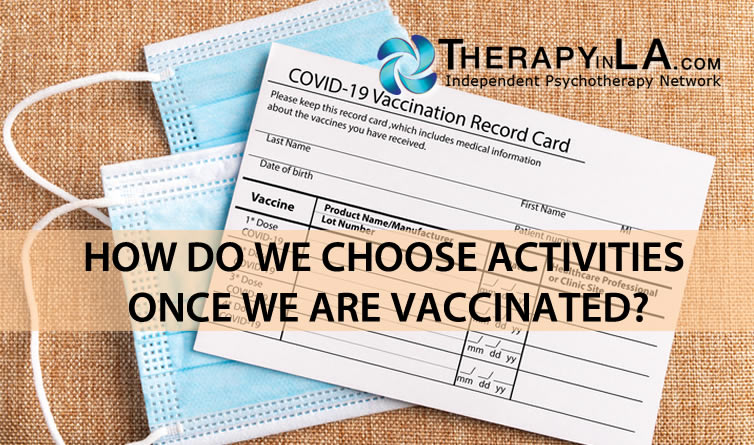HOW DO WE CHOOSE ACTIVITIES ONCE WE ARE VACCINATED?
HOW DO WE CHOOSE ACTIVITIES ONCE WE ARE VACCINATED?
Recent blogs have been about vaccination-related topics: efficacy/effectiveness, a “case study” in Israel, scheduling appointments, and psychological factors that impact vaccinations. All of this reflects the reality of growing numbers of us being vaccinated, or considering that choice, and “light at the end of the tunnel” of pandemic restrictions (now 13 months long at the time of this writing). The next set of questions and challenges are: What can we do safely once we are vaccinated?
The CDC has issued guidelines. Media reports have shared this information, along with reports on various options that are becoming available. Yet, for each of us, individually and as family members or friends, an “individual risk assessment” is necessary. To engage in this evaluation more thoughtfully, the New York Times recently (March 30, 2021) published a guide (https://www.nytimes.com/interactive/2021/03/30/opinion/coronavirus-vaccine-risks.html?action=click&module=Opinion&pgtype=Homepage ).
The guide includes the following factors:
- “What are you doing: is it indoors, for more than an hour, with high intensity or shouting? How ventilated is the space?”
- “Whom will you be with: will there be more than 10 people, around many people you don’t know, with people vaccinated, who are following health guidelines?”
- “Who is in your circle: kids, unvaccinated adults, adults immune-compromised or high risk and unvaccinated?”
- “Where do you live?” What is the level of risk in your county or community?
- “What is your own health: underlying health risks for COVID 19, can you stop working if you do get sick to isolate yourself, what is your access to sick leave, testing, and essential supplies if you’re ill?”
If you complete the above questions at the linked article, you’ll receive a risk rating in these five areas. And then, you have to consider your own risk tolerance. If you have a low tolerance for risk, then various possible activities may seem not a good choice. If you have a higher risk tolerance, then more activities will seem worthwhile. Only you can make this assessment and choice, respect the choices made by others, and request others close to you to respect your choices.
Therapists with IPN are very engaged in helping clients make these choices, with careful consideration of their own risks, as well as the risks they introduce into the lives of their family members.
Alan M. Solomon, Ph.D. is a clinical psychologist in private practice in Torrance, CA. A member of the Independent Psychotherapy Network, he can be reached at 310 539-2772 or dralanms@gmail.com Telehealth sessions are available. In-person sessions are being resumed with cautionary steps.
Copyright 2021 by Alan M. Solomon, Ph.D.

